MLM Analytics: Unlocking the potential of data for growth

Introduction
Data has become the “big word” for businesses today. The role of data cannot be replaced with anything whatsoever. The reason? Data has got the infinite potential to transform businesses in all directions. Multi-level marketing businesses, from small startups to large enterprises, generate data in varying magnitudes, both online and offline. Websites, social media, and ecommerce are all significant sources of data. These channels help businesses decipher data about customers, their psychographic and demographic attributes, web traffic, and more. With so much in hand, businesses can excel only if this raw data is processed and utilized effectively.
The success of businesses today is measured by their ability to transform data as a potential for growth. Data-driven companies are 23% more likely to outperform their competitors in terms of customer acquisition, the exact reason why companies should capitalize on the power of data. Almost all business processes are governed by data and most teams rely on data to assess and improve their future efforts.
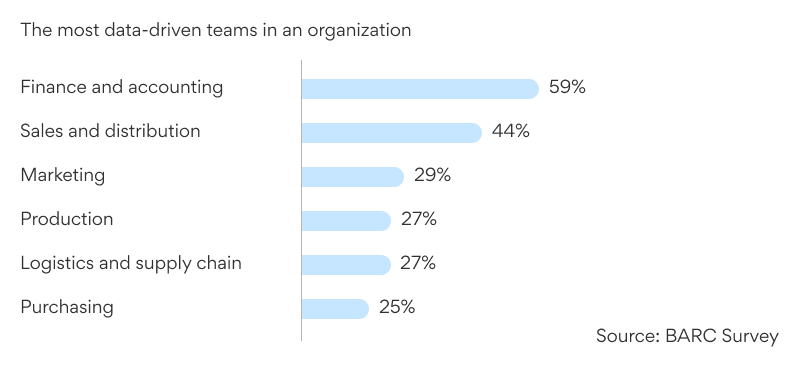
Data-driven companies are 23% more likely to outperform their competitors in customer acquisition.
— McKinsey
Importance of analyzing data in MLM
Multi-level marketing, a business model well-known for its strong networking power and limitless growth opportunities, data plays a key role in determining the success and sustainability. This white paper examines the importance of analyzing data in MLM business and how it is bound to transform the business for good.
Data gives businesses an alternative power to level up their business in various impressive ways.
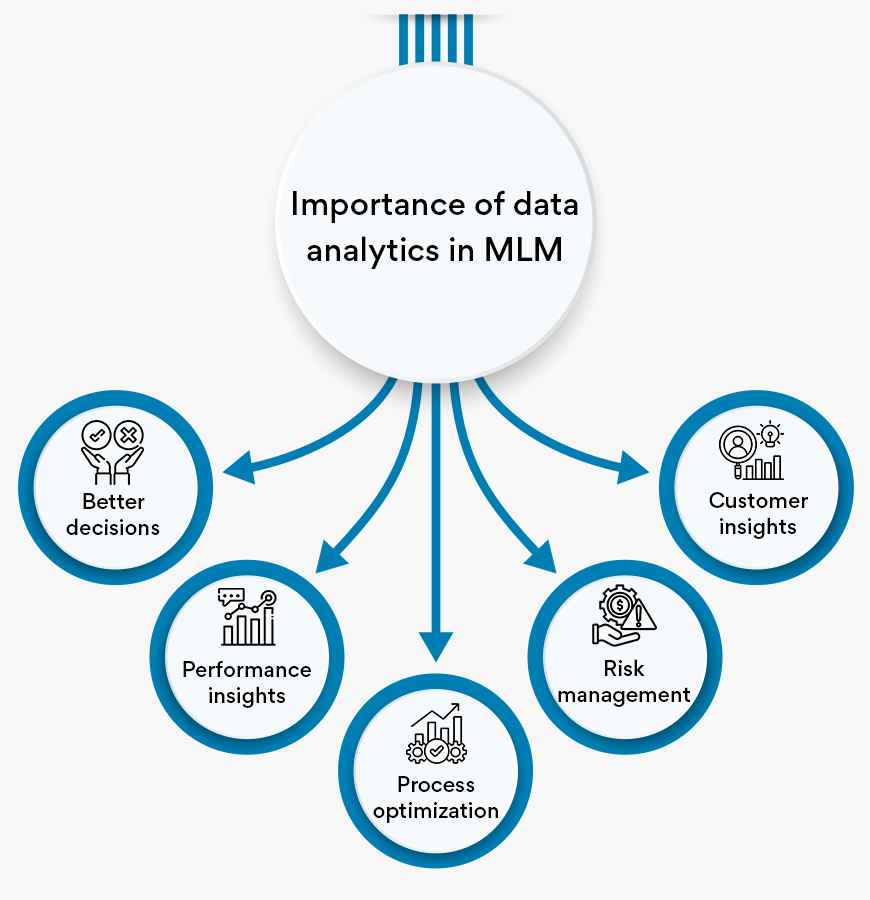
Helps make better decisions
Data gives businesses the confidence to make smarter decisions about everything associated with the business—customers, distributors, and business processes.
Helps understand performance
Performance, be that of the business as a whole or its contributing parts, products, customers, distributors, market, etc, data gives businesses a complete picture of their performance.
Helps improve processes
Complex business processes can cost businesses significant time and resources. With data, businesses can easily identify processes that need improvement.
Helps mitigate risks
Data empowers businesses to identify risks and challenges at a very early stage and respond to them promptly, before they become a full-blown crisis.
Helps understand customer behavior
Crucial to any brand’s growth strategy, knowing their customers, their preferences, and catering rightly to their needs become easy with data.
Important metrics or KPIs to analyze in MLM
Data comes in all forms and sizes, every minute and every second. How should businesses handle this rapid inflow of data? What are the key metrics that MLM businesses must analyze to optimize their success journey?
We analyzed the most importance metrics and how they impact business performance.
Compensation plan performance
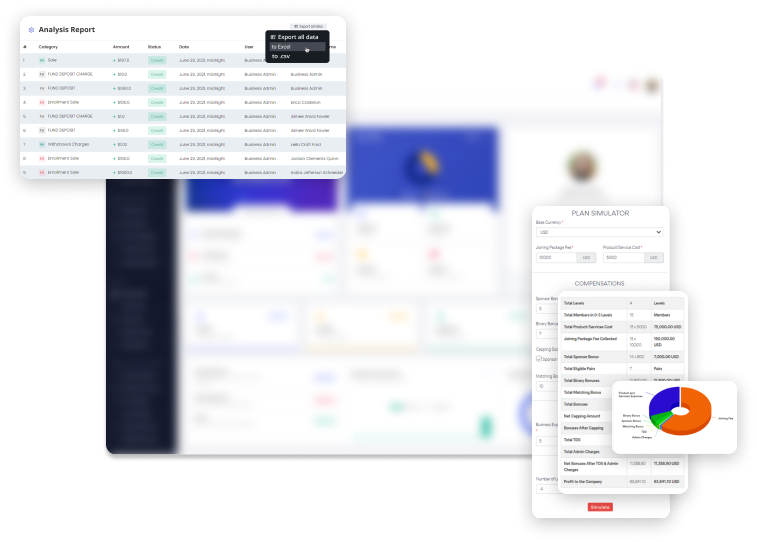
Analyzing the performance of compensation plan helps MLM companies ensure fairness and effectiveness in their reward system. Overpayments can drain businesses their revenue and insufficient compensation can result in higher attrition rates.
Data derived through critical analysis of MLM compensation plan can highlight the performance of individual distributors and their teams. Monitoring key metrics within the compensation plan such as sales volume, rank advancement, bonuses, commissions, and incentives can hint on its performance within the MLM network.
Companies can rightly identify where their revenue is draining and why. Optimizing their plan with data-driven insights can help them navigate the complex challenges posed by an inefficient compensation plan.
Product performance

Hundreds of products serving an increasing customer base across diverse markets are a crucial key performance indicator for an MLM business.
Tracking product performance consistently can reveal distinct product patterns and sales trends such as fast moving and slow moving products. This way, MLM companies can efficiently handle their inventory and identify products that contribute substantially to their revenue. Analyzing product performance also reveals customer preferences and market demands.
Sales conversion rate
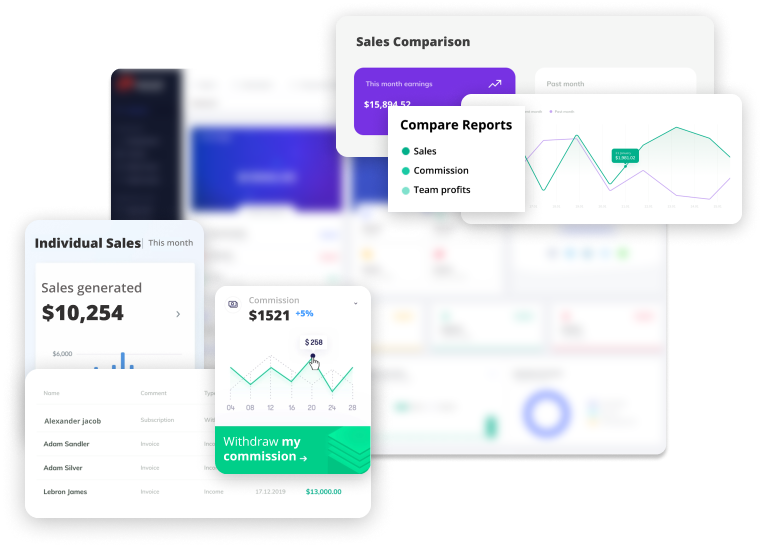
High quality leads and innovative approaches accelerate a brand’s sales conversion rate. It is also indicative of the efficiency of their sales process. Constantly monitoring the percentage of assured lead or prospect conversions can unveil valuable pointers into the effectiveness of sales teams, marketing activities, and products in converting leads into actual sales.
Sales conversion rate analysis represents the performance of individual distributors, pinpoint areas for improvement in the sales process, and help brands allocate resources more efficiently to maximize sales and revenue.
Engagement rate
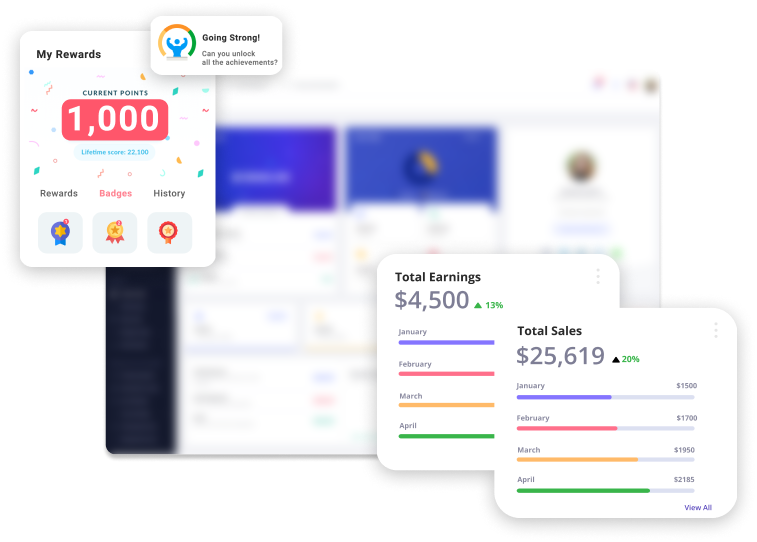
Crucial to any business and particular to MLM, maintaining a steady engagement rate contributes to the long-term sustainability of brands. Measuring brand engagement across websites, social media channels, mobile apps, among others, can underline the acceptability of brands among their distributors and customer base.
Metrics such as number of active distributors, training completion rates, and customer interactions determine how engaged distributors are with the brand. Higher the engagement rate, higher the retention rates and sales. Just as measuring distributor engagement is important in MLM, so is customer engagement.
Website traffic and social media engagement metrics such as likes, shares, and comments show how well customers interact with the brand. Analyzing engagement rate help MLM businesses identify areas of low participation and introduce new communication and team building strategies to strengthen their MLM community.
Active distributors
The health of an MLM network hinges on the active involvement of its distributors. An MLM network with a high number of inactive and low-performing distributors may struggle to meet sales targets and expand its reach. When all the distributors in an MLM network actively participate in sales and other brand building initiatives, it accelerates brand building.
This metric alone is a leading indicator allowing MLM brands to forecast revenue and make strategic decisions. For instance, a sudden decline in the number of active distributors signals underlying issues such as lack of training and collaboration, poor communication, absence of efficient sales enablement tools, or dissatisfaction among distributors.
Identifying these issues in real-time can help prevent further decline and take the brand toward growth. This can also encourage and activate low performers and inactive distributors.
Acquisition rate
This metric calculates the rate at which customers or distributors join the MLM company or make a purchase. It measures the ability of the MLM company in bringing new customers and distributors into their network.
Monitoring acquisition rate indicates the effectiveness and ineffectiveness of strategies and channels employed. Brands can identify channels that lead in their customer acquisition process. Analyzing acquisition rate over time can provide valuable insights into the trends and patterns, allowing MLM companies to optimize their network expansion process.
Customer satisfaction
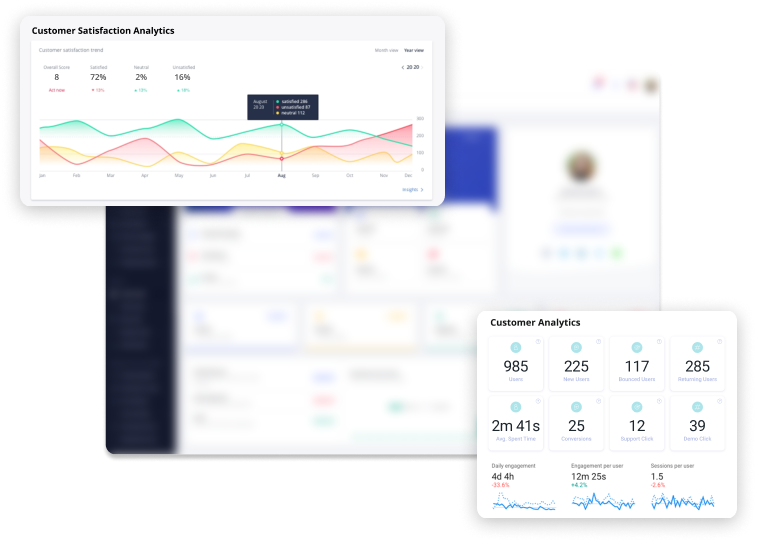
It goes without saying why tracking customer satisfaction is important. Satisfied customers stay more loyal to the brand and continue making repeat purchases. This considerably reduces the need for brands to acquire new customers. Positive customer experiences enhance brand trust and credibility, attracting new customers to the brand with less effort.
Analyzing customer satisfaction thus becomes imperative for brands to understand about their products or services, and overall customer experience. Customer satisfaction can be measured through surveys, ratings, reviews, etc. Monitoring Net Promoter Score (NPS) and Customer Satisfaction Score (CSAT) also hint largely on customers’ brand experience.
Customer Lifetime Value (CLV)
As previously stated, satisfied customers are an asset as they promise consistent revenue for businesses. This also help brands identify their most valuable customers, which is why 25% of marketers consider CLV as one of the top 5 marketing metrics to track.
25% of marketers consider customer lifetime value as one of the top 5 marketing metrics.
— Gartner
Analyzing CLV can help marketers in their customer retention efforts by identifying customers who are at the risk of churning and formulate strategies for long-term retention. This can also help identify those specific set of customers who contribute most to the revenue, their preferences and behaviors. This information can help brands segment audience and tailor approaches accordingly.
Retention rate analysis
Monitors the rate at which distributors and customers continue their relationship with the brand. This is also key to identifying the factors that contribute to higher retention rates. Retention analysis helps brands understand where, why, and how customers churn, making it easier for brands to tune their marketing process.
5% increase in retention can present companies with 25-95% increase in profits, with 65% of the sales accumulating from repeat customers.
— Zippia
Higher retention rates lead to more predictable revenue helping brands forecast their revenue streams. Just a 5% increase in retention can present companies with 25-95% increase in profits, with 65% of the sales accumulating from repeat customers. Retention analysis is also a great way for brands to establish a strong brand reputation. Brands with higher retention rates have the competitive advantage of staying at the forefront of market.
Average Order Value (AOV)
Analyzing a brand’s AOV presents opportunities for revenue maximization through strategies like upselling and cross-selling. An in-depth analysis of AOV allows MLM companies to evaluate the performance of different products, that is, products with higher AOV indicate stronger demand among customers.
AOV is also a valuable metric that directly impacts the profitability of MLM businesses. Higher order values give brands higher margins. By understanding AOV trends, MLM companies can alter their pricing strategies and product offerings to maximize profitability.
Customer success stories: Leading MLM companies are driving remarkable results with competent solutions
Advantages of data analytics in MLM
Like for any other business, analyzing data in MLM, across various business verticals holds an indefinite power to help MLM companies grow in a consistent and reliable way. Data analytics, if leveraged suitably, becomes a strategic tool that empowers MLM companies with incredible insights into customer behavior, market trends, distributor performance, and more. Data-driven approaches can not only help optimize MLM operations but also align the business with regulatory standards, thereby mitigating the risk of penalization.
Here is a deeper analysis of the many advantages data analytics can bring to MLM businesses.
Improves operational efficiency
Most anticipated and impactful advantage of data analytics is its ability to transform the potential of business processes. Analyzing every minute detail of organizational processes can generate valuable insights that could be applied to optimize resource allocation and improve the efficiency of business processes.
Delivers better customer insights
Customer data analysis opens up new doors for companies to surprise their customers with even more personalized and value-driven approaches. Gaining insights into customer feedback, preferences, complaints, and demands, MLM companies can identify what keeps their customers happy, issues they face, and how fast their needs and concerns are met. These crucial discoveries can help companies in improving their overall customer service experience.
Data analytics segments customers according to their demographic and psychographic attributes. This approach helps companies tailor their strategies unique to each segment.
Identifies market trends and patterns
The shifting marketing dynamics make it difficult for MLM companies to adapt and align with the changing market conditions. Keeping a constant watch over the market trends is crucial for businesses to stay up-to-date.
By analyzing various business data such as product performance, sales conversions, and customer demographics, businesses can predict emerging market trends and identify untapped growth opportunities with great accuracy.
Optimizes marketing processes
Data analytics allows marketers to segment their audience based on demographics, psychographics, and purchase history. This segmentation helps in creating more targeted and relevant marketing campaigns.
Data analytics also helps marketers identify the most effective marketing channels to connect with their target audience. Analyzing customer engagement and conversion rates across these channels help marketers allocate their marketing budget more efficiently and prioritize channels that deliver the highest ROI.
Improves training programs
Data analytics can considerably improve the effectiveness of training programs right from identifying training needs to monitoring post-training performance of distributors.
MLM companies can analyze distributor data to identify skill gaps, low performers, and areas where training is needed. This creates a more tailored approach to individual distributor requirements.
Based on individual distributor skills, knowledge levels, and learning styles, businesses can curate personalized training recommendations for each distributor. Training programs can also be delivered according to the pace and progress of distributors.
The efficiency of distributor training can be evaluated by tracking metrics such as course completion rates and performance improvements. Insights derived can be put to improvize training programs in the future.
Accelerates sales conversions
The capabilities of data analytics lie well beyond just analyzing data. The insights on customers, products, markets, and sales processes serve as a fundamental step that shapes the success and identity of brands.
By analyzing customer behavior across various sources such as website interactions, social media engagement, purchase history, and shopping preferences, businesses can identify what motivates customers to purchase from the brand, and tailor their sales approach to increase conversions.
Data analytics also plays a crucial role in optimizing the sales process. MLM companies can avoid bottlenecks and significantly improve the efficiency of their sales process by analyzing data on various sales activities, conversion rates, and sales cycle length. Businesses can identify areas for improvement and devise strategies to shorten their sales cycle.
Helps deliver personalized experiences
Data helps establish better relationships with customers by delivering personalized brand experiences. Customers turn into repeat buyers with recommendations that resonate with their interests and preferences.
Today, 92% of businesses employ AI-driven personalization to drive growth.
— Statista
In the ecommerce MLM sector, personalized recommendations have consistently improved cart abandonment rates and sales. Besides enhancing customer satisfaction, personalization can boost engagement and loyalty, resulting in increased customer lifetime value.
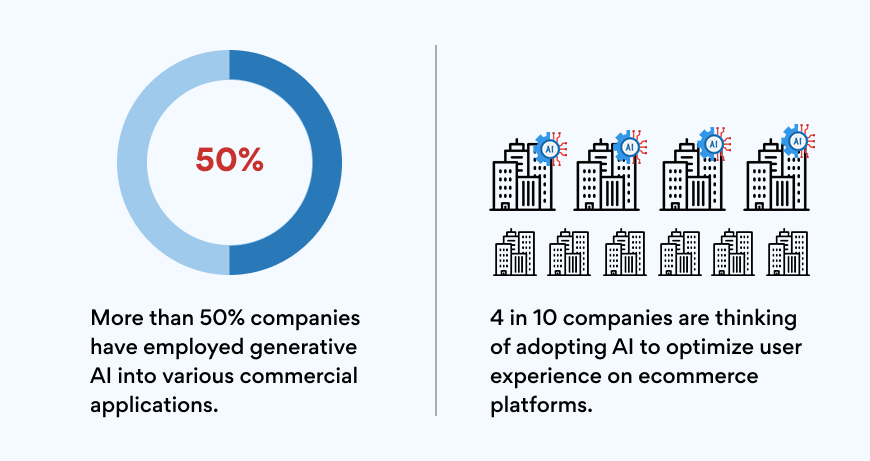
With increasing concerns on privacy regulations, MLM companies must strictly adhere to data compliance policies when analyzing customer data for personalization.
Saves costs
MLM businesses can identify underlying opportunities to reduce costs, optimize resources, and minimize wastage through concurrent analysis of data. A survey done by Statista reveals that majority of businesses who have made significant investments in data analytics have drawn measurable business value.
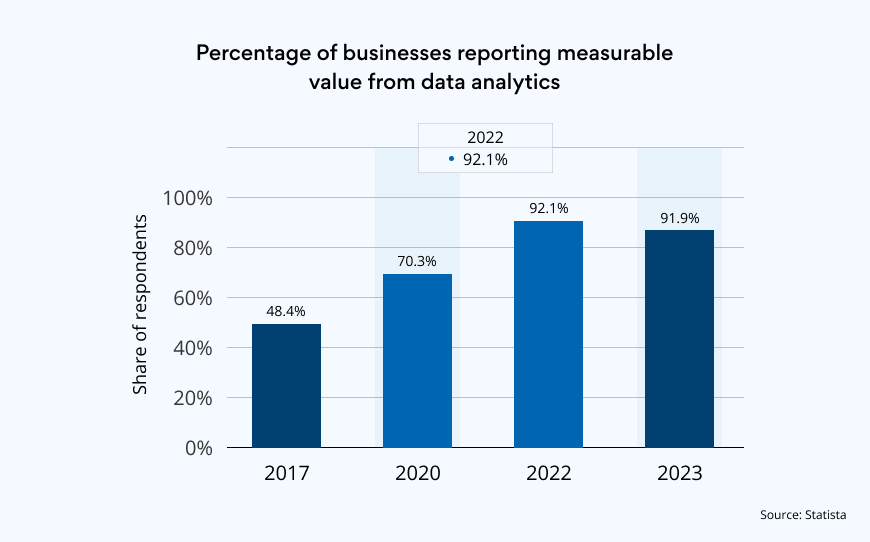
91.9% businesses accepted that they have witnessed a return on investment on data analytics. The number is surely going to rise in the near future with more and more businesses integrating data analytics into their business.
Inventory and supply chain optimization
Analyzing data on stock levels, shipping routes, transportation costs, and delivery times, is an excellent way to forecast product demand and customer behavior. This allows companies to efficiently manage their inventory levels to meet any surge in customer demand while minimizing overstocking or stockouts.
Applying analytical insights enable companies in route optimization and ensure on-time deliveries, thus enhancing their supply chain efficiency. Inventory and supply chain analytics reveals key risk indicators, appropriate management of which can minimize the impact of disruptions in their business operations.
Risk management
Data-driven approach to risk management allows MLM companies to quickly identify and mitigate operational risks such as cyber frauds, compliance violations, supply chain disruptions, and security compromises. By monitoring key risk indicators and implementing proactive risk prevention strategies, MLM companies can curb cyber attacks, enhance organizational security, and protect their brand reputation.
Supports smarter decision making
Data-based decisions are more like a promise for businesses in their journey forward. It is always consistent and reliable. Insights derived from analyzing trends and patterns in the business which may not be immediately apparent, can power up key strategic initiatives and process optimizations.

With the help of data analytics, MLM companies can run a historical analysis to realize what has worked best and what has not. Predictive analytics leverages these insights to predict possible outcomes. Thus, data becomes a reliable partner in driving critical business decisions, today and tomorrow.
Reduced distributor attrition rates
Analyzing distributor data can allow companies to get a fair idea of how their salesforce is performing, where they are staggering, and what measures need to be implemented to get them going. A critical analysis of the compensation plan can inform companies of how satisfied and happy their distributors are with the current compensation structure.
Data analytics help MLM companies in addressing distributor attrition by analyzing
Distributor performance
Compensation plan performance
Course completion rates
Distributor engagement rates
Analytical insights thus derived could be implemented strategically to empower and engage distributors in their brand journey. This ultimately will cut down on attrition rates.
Improves security
Organizational security analytics can promptly identify risks or potential threats and address security vulnerabilities before attackers get on it. Data analytics can identify suspicious patterns and anomalies that could lead to a data breach. MLM companies can quickly respond to these unusual events and prevent further damage or loss of data.
Gives businesses a competitive advantage
Data analytics can arm businesses with crucial insights on customers and markets. Access to real-time insights, companies can adapt to changing market conditions, customer preferences, and other competitive threats. Through actionable insights and performance metrics analysis MLM companies can formulate proactive strategies to meet and beat the competition.
Data analytics equip businesses with improved agility to unlock newer opportunities across various business verticals. Through data analytics companies can identify and assess the impact of various risks such as market fluctuations, shift in customer preferences, regulatory changes among others. Rightly identifying these risks help companies minimize potential negative impacts and maintain a steady position in the market.
Leverage a smart MLM platform with data insights to navigate market changes and capitalize on new opportunities.
Request demoFactors to consider while implementing analytical findings in a multi-level marketing business
An advanced MLM platform can help derive data-driven insights for multi-level marketing businesses. What next? Implementing these insights into the business demands careful consideration of many crucial factors to ensure effectiveness and success.
Data quality
One thing that cannot be compromised in the data analytics process is the accuracy and reliability of data. Poor data quality can lead to inaccurate insights resulting in flawed decision making.
Business goals
Ensure that the implementation of the analytical findings align rightly with your MLM business objectives.
Target audience
Every insight generated should be tailored at the implementation level to meet the demands of distributors, customers, and prospects within the MLM network.
Training and support
Everyone involved in the business must be capable of understanding and implementing the insights in their respective domains. Provide them with appropriate training and support to practically implement the findings.
Monitor performance
The last and the most crucial step is to monitor the performance after implementing analytical findings. This will ensure effectiveness and open new opportunities for growth.
Future trends and opportunities with data analytics in MLM
Multi-level marketing, with its extensive networks, is soon going to witness groundbreaking transformation with data analytics. The power of data is not going to subside any sooner but will rise above the waves of competition and evolving market dynamics. In a data-driven ecosystem, businesses will not be disrupted by unexpected turns, whatsoever. Data will govern the future of businesses from manufacturing to market.
Hyper-personalization will rule the market
Advanced machine learning algorithms will analyze organizational data related to distributor and customer behavior to generate highly personalized recommendations.
In MLM ecommerce, personalized product recommendations will translate into increased sales conversions. Delivering relevant content and promotions will add to the effectiveness of marketing efforts creating an unforgettable brand experience for customers.
Predictive modeling will make more accurate predictions
Rapid developments in the field of predictive modeling will establish more accuracy and reliability in forecasting the future for MLM businesses. Incorporating various factors such as seasonality, market dynamics, changing customer preferences, data analytics will give companies the needed competitive edge to stay successful.
Training and support will see new dimensions
Increase in sophistication of data analytics tools will enable MLM businesses to get into the minute details of individual distributors, analyze their performance, track progress, and rightly identify areas where additional attention might be required.
MLM companies will be able to create personalized training sessions according to each distributor proficiency and skillset. These include tailoring courses, curating resources, and rendering support according to each distributor need.
Compensation analytics will catalyze MLM growth
Data analytics will empower companies to take the next big leap in shaping their success with higher-level optimization of MLM compensation plans. With a more sophisticated view of their compensation plan performance, companies can create dynamic commission structures.
Advanced analytical insights on current compensation plan can help companies create more adaptive and responsive structures that can align with their growth goals.
Advanced techniques in data analytics can detect abnormal patterns or anomalies that hint on possible manipulation or flaws in the compensation plan. Proactive monitoring of transactional data equip companies to take corrective actions promptly to maintain the integrity of their compensation plan.
Network expansion will be more consistent
Analytics will help MLM businesses identify niche markets and segment them based on demographics, market trends, and purchasing behavior. Businesses can tailor their expansion strategies based on the derived insights.
Analytics can further drive efficiency in their expansion efforts through customer profiling whereby businesses can create detailed profiles of their target audience and devise more targeted marketing campaigns and product offerings.
Tap into your growth potential and shift your business into high gear with advanced data analytics embedded MLM software.
Request demoConclusion
The advantages and opportunities of data analytics in MLM business are endless. So are the challenges. 79.8% of data analytics leaders points out that culture, people, process, or organization stand as the primary obstacle to becoming data-driven. So, the challenge lies not only in the quality and quantity of data but in the openness of organizations and their members in welcoming the change. Everyone involved should be well-informed and receptive about the transformation the organization is set to undergo to ensure maximum impact and success.
Epixel MLM Software anchored 100+ network marketing companies to success through their business process automation in more than 88 countries. Let Epixel MLM Platform revolutionize your MLM business with 100+ proven features intelligently tuned for small, medium, and large enterprises.
